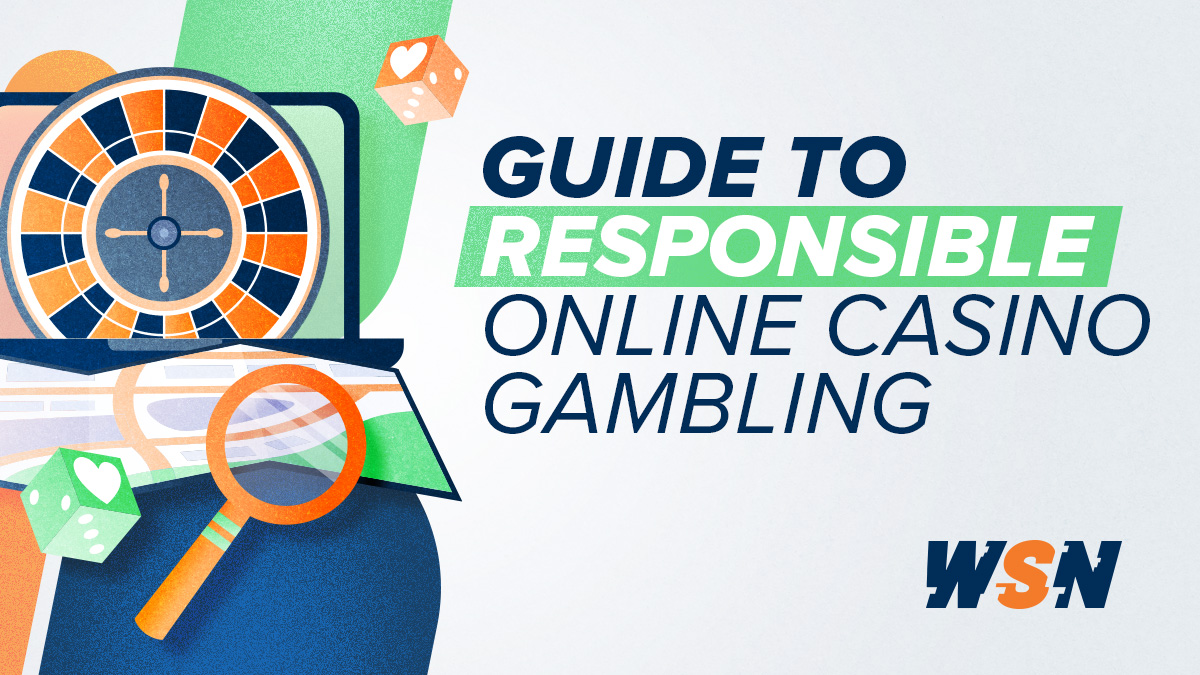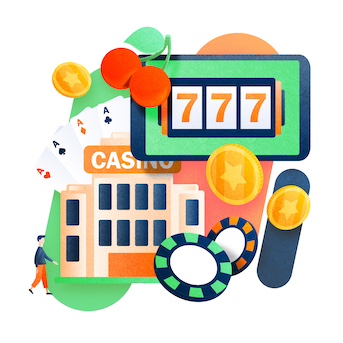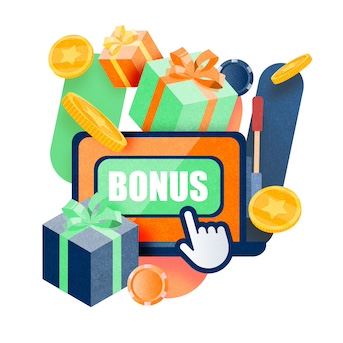
To learn more check out our
Editorial Guidelines.
21 min read

The spread of legal online casino gaming around the US has meant unprecedented access for US gambling fans, bringing your favorite games right into your home and available 24/7. This convenience comes with significant risks, and players need to understand how to gamble responsibly online to protect their safety.
This page explores the differences between online and brick-and-mortar casinos and the tools and strategies available to help players gamble responsibly and stay in control. We will also discuss how to spot regulated vs. offshore online casinos and why it matters for responsible gambling.
 How are Online Casinos Different from Brick and Mortar Casinos?
How are Online Casinos Different from Brick and Mortar Casinos?Online casinos are different from brick and mortar casinos in several ways. First of all, online casinos are accessible through the internet, while brick-and-mortar casinos require you to actually be physically present. This makes online casinos available 24/7, so you can access them from anywhere at any time. It takes a lot more effort to travel to a brick and mortar casino to play.
Online casinos can offer a vast range of games compared with brick and mortar casinos. You can often find thousands of online slots, and hundreds of table games, and other forms of gambling in online casinos, while brick-and-mortar casinos typically have a more limited selection of games. Online casinos aren’t bound by things like space or requiring a certain number of staff to run their games.
Playing online is typically a much more solitary and individualistic experience. While many people treat going to the casino as a night out with friends, like going to a nightclub or to the movies, online gambling doesn’t have the same social element.
Finally, online casinos offer more convenience compared to brick-and-mortar casinos. You don't have to dress up, travel, or deal with crowds to enjoy your favorite games. You can gamble from the comfort of your home and even on the go with mobile apps.
All of this means it can be more difficult to control your gambling habits with online casinos compared to brick and mortar casinos. When you always have a casino in your pocket, there is nothing stopping you accessing it any time you feel the urge.
Overall, while online casinos do offer several benefits compared to brick-and-mortar casinos, it's essential to recognize that these positives come with potential risks.
Legal and regulated online casinos provide various tools to help you practice responsible gambling. Often, these measures are mandated by the regulatory body, although the specific requirements vary state by state in the US.
Check out your profile or account settings to explore the options at your sportsbook. The resources could be labeled with something similar to “Responsible Gambling” or “Player Protection.” However, you can contact customer support if you need help finding the tools.

Expert Opinion - Gamification of Responsible Gambling
Incorporating elements of gamification into responsible gambling tools can revolutionize the way players engage with these features, making them more interactive, rewarding, and effective. By applying principles of game design to responsible gambling initiatives, online casinos can transform routine tasks into engaging experiences that encourage players to take proactive steps towards safer gaming habits.
One approach to gamification involves implementing achievement systems, where players earn badges, rewards, or virtual currency for completing responsible gambling actions, such as setting deposit limits, taking breaks, or participating in self-assessment quizzes. These achievements can be displayed prominently on player profiles, fostering a sense of accomplishment and motivating continued adherence to responsible gaming practices. Another gamification strategy is to introduce challenges or quests related to responsible gambling goals, such as maintaining a streak of consecutive days without exceeding deposit limits or successfully completing a self-exclusion period.
By framing responsible gambling as a journey or adventure, casinos can make the process more engaging and enjoyable for players, ultimately promoting a culture of safer and more sustainable gaming.
- Pat Eichner
Associate Partner at GMA Consulting
When playing online, especially if you feel like overspending is an issue for you, deposit and betting limits are an essential responsible gambling tool. These customizable tools enable you to set boundaries for the amount the platform will let you deposit and wager over a given period of time.
These tools can really simplify the process of bankroll management. For instance, you can set your deposit limit at $50 per week and as soon as you hit that threshold, you simply won’t be allowed to spend any more money. It works just as well for smaller stakes players as high rollers: whatever you feel comfortable spending (and losing), you can set the limits accordingly. Ultimately, it helps you save money and focus on having fun while gambling.
A reality check is simply a reminder to take a break, that kicks in after you have been online for a certain period of time. Sometimes, it even locks you out for a short period of time. Reality checks are especially useful when you simply lose track of time, or go into a bit of a gambling rabbit hole. For many people, simply being told they have been playing for more than an hour or two is enough to make them take a break.
Taking regular breaks is a huge part of responsible gambling, and the reality check tool exists for exactly this reason. Often it’s not even a customizable tool in the way that the deposit limits are. Instead, the casino just automatically implements it for all players.
Time-outs are like the next step after a reality check. In this case, you can take a pause by temporarily locking yourself out of your account, so you can’t play even if you want to. It removes the temptation and counteracts compulsive habits.
Usually, you can choose the duration of your time-out, from 24 hours to a couple of days, a week or even longer.
People use timeouts for different reasons. Maybe they want to limit the amount of time they play per day or per week. Maybe they have a lot of work or another project they need to focus on, and gambling online is distracting. Or maybe, they are struggling with gambling or spending too much and need a hard break for a while. However you use it, the time-out tool helps keep you in control.
Self-exclusion is similar to time-out, but more extreme. It’s a voluntary measure that permanently blocks you from accessing the gambling platform and withdraws yourself entirely. It’s also irreversible. This tool is for anyone who has developed a serious problem, or has simply decided they want to stop gambling on a certain site permanently.
It’s the most drastic step, but is an absolutely essential tool for people who have developed gambling problems.
Online casinos and sportsbooks have their own self-exclusion programs, but there are also statewide self-exclusion schemes that block you from playing at any licensed casino or sportsbook in the state.

Expert Opinion - Personalized Approach
Personalized responsible gambling tools represent a tailored approach to promoting safer gaming behaviors by leveraging player-specific data and preferences. By harnessing the power of data analytics and machine learning algorithms, online casinos can create customized intervention strategies that address the unique needs and risk profiles of individual players. These tools analyze factors such as playing patterns, spending behaviors, and risk indicators to develop personalized recommendations and interventions. For example, players identified as high-risk based on their gambling history may receive targeted prompts to set stricter deposit limits or take regular breaks during gameplay.
Conversely, players exhibiting low-risk behaviors may receive gentle nudges to maintain their responsible gaming practices and continue making informed decisions. By offering personalized responsible gambling tools, online casinos empower players to take greater control over their gaming experience while respecting their autonomy and individual preferences. This personalized approach fosters a culture of responsible gambling and supports players in maintaining healthy gaming habits over the long term.
- Pat Eichner
Associate Partner at GMA Consulting
From a player safety perspective, playing on a regulated site is extremely different from playing at unlicensed offshore sites. To make it even more complicated, you might well not even notice the difference until it’s too late, when you realize you are having issues accessing your money and can’t get answers from customer support.
The availability of responsible gambling tools, identity verification, and financial security measures, are all areas where legal sites are a cut above unregulated sites.
To sum it up in a single sentence: regulated casinos are legally obligated to protect their players in a variety of ways and if they don’t they will lose their license, while offshore sites have little or no regulatory oversight and are pretty much free to do what they want.
Regulated sportsbooks display their licenses on the web page or app. Usually, you should scroll down to the bottom of the page to check that the platform is licensed in your state. You can also reach out to customer support to check if you’re unsure.
Finally, it’s worth noting that many offshore sites do in fact have gambling licenses - but they may be from outside of your jurisdiction, which means you aren’t actually entitled to any protection. Only choose casinos licensed in your state or country.
In regulated online casinos, players can use the suite of responsible gambling tools that we’ve already covered. The customers can set limits on deposits, losses, and wagers, take timeouts (and set timed limits), or completely exclude or ban themselves from the platform.
All of these tools act together to empower the player, and create a safer and more stable gambling environment.
On the other hand, there is no guarantee that offshore sites will provide all or any of these tools. Sometimes, even when they do provide tools, they aren’t properly implemented or can be overridden.
Again, it comes back to the fact that they are not obligated to do so by any gaming commissions or regulators. It’s not even that all offshore sites are scams, or that none of them provide responsible gambling tools - simply that you never know.
Providing effective responsible gambling tools to customers of the casinos is essential for safer gambling. They create protection, and increase trust and fairness across the games.
KYC, also known as Know Your Customer, is a process used by regulated online casinos and gambling platforms to verify the age and identities of customers - which is a legal requirement at licensed sites. The casino may require copies of personal documents, like a driving license or passport. Additionally, they will detect risk factors for problem gambling at this stage, for the customer's benefit.
On the other hand, depending on which offshore casino you use, there is a good chance that casinos aren’t using KYC or identity verification, and instead are happy to accept pretty much any customers. However, this isn’t for all casinos; some offshore casinos do verify the identity of their users and try to protect against underage gambling.
KYC and identity verification are important as it is the first step to preventing underage gambling. Once the users are verified, this helps the casinos understand their customers, including signs for issues such as problem gambling. For those people, KYC is essential as it will help them increase their chances of staying out of debt and protecting their mental health. Ultimately, it exists to protect players.
When customers add their hard-earned cash to online casinos, it is important to ensure that it is well-protected and safe, and that their banking information is used properly. There are differences in the levels of protection across the regulated and offshore casino industries.
In regulated casinos, in addition to the strict financial regulations, the funds are held within a trusted, robust security framework. In these casinos, the payments are processed with encryption technologies such as SSL (Secure Sockets Layer) and TSL (Transport Layer Security) to ensure the data isn’t readable to potential hackers. While using these technologies, fraud detection systems read each transaction for errors or abnormalities. Additionally, if you want even more protection for your data, you often opt to use two-factor authentication.
For offshore casinos, the financials can be less secure. For instance, there is a chance a casino may include similar encryption and fraud detection to regulated casinos, but not with the same regulations and best practice implementation. There are plenty of sites that have very limited or no security measures surrounding payments, and no restrictions on how or where they hold your money once you do make a deposit. And it’s also true that there are some more reputable offshore casinos that prioritize financial security with robust measures.
The problem is that you never really know, and unlicensed casinos are free to implement whatever form of site security they want. Ultimately, it means that when players are gambling on offshore casinos, there is a higher risk of data breaches and hacking attempts. To remove the element of doubt, stick to the licensed options.
 Understanding Online Casino Bonuses
Understanding Online Casino BonusesWhether you’re brand new to gambling online or a regular player already, understanding how bonuses and promotions work lead to more informed and responsible decisions when gambling.
Online casinos offer all kinds of bonuses to encourage players to sign up and keep playing. While these offers can be legitimately valuable, it’s worth stating plainly that casinos never provide any bonuses that they don’t think will ultimately benefit them in the long run. If something sounds too good to be true, or you think you’ve spotted a loophole with a bonus - you’re almost certainly missing something.
Getting swept up with bonuses and promos can be counterproductive for responsible gambling. You can overpend trying to chase more bonuses for instance, or while trying to clear wagering requirements. Appreciate bonuses for what they are, but don’t think they are a path to guaranteed wins or some kind of cheat code.
And, of course, always read the terms and conditions carefully and make sure you understand a bonus before you opt-in. Here are a few things to keep in mind off the bat:
Wagering requirements: Any time a casino gives you “free money”, “bonus cash” or anything like that, it has wagering requirements attached. This means you need to use the money to gamble a certain number of times before you are allowed to withdraw any winnings. For example, if you get a $100 bonus with 20x wagering requirements attached, you would need to wager $2,000 before you can cash out - which is a lot. Clearing wagering requirements (or playthrough or turnover, as it’s also known) can be time-consuming and expensive. High wagering requirements can have a huge effect on the real value of bonuses.
Time Limits: There is usually a time limit attached to claiming or using a welcome bonus. The same goes for clearing the wagering requirements. If you don’t use or clear your bonus in time, it will expire.
Don’t feel like you need to claim every single bonus you come across either, which can be time-consuming and, frankly, can become boring if you wind up playing games you weren’t actually interested in to begin with. Again, casinos never offer any bonuses that aren’t ultimately in their interest.
A welcome bonus is a special offer exclusively for new players. It is the casino's way to entice you to sign up to their casino and start gambling. There are different types of offers out there, but normally it’s a way to boost your bankroll when you first sign up.
A deposit bonus is a typical welcome offer for new players, but some casinos also provide deposit bonuses for existing players (known as reload bonuses). With this offer, the casino matches some or all of your first deposit with bonus money, up to a certain limit. The more you deposit, the more bonus cash you get.
This can be dangerous: don’t deposit more than you intended or are comfortable with just to increase your deposit bonus.
Deposit bonuses increase your bankroll off the bat, meaning you can play more and more varied games. However, it’s important to remember that it’s not as simple as getting free money - despite what the casino might imply. Wagering requirements mean that large deposit bonuses can be very complicated to clear, and it can take a long time before you can even withdraw any winnings. In many cases, players simply give up or end up going bust before they clear their bonus money.
Some games may be restricted from using the bonus money, like live dealer tables for instance.
Ultimately, many players decide that large deposit bonuses - while seeming great at first glance - just aren’t worth the effort, especially if they have unrealistic conditions like high wagering requirements.
If you get one, make sure it fits into your existing plans for how you intend to gamble. Don’t get caught up in the excitement of maximizing your bonus, or spend more time or money than you intended trying to clear the wagering requirements. And always read the conditions ahead of time.
Free spins are an ideal bonus if you’re a fan of online slots. Each free spin represents one free game on a slot machine. If you win, you only get to keep the winnings from the spin and your profit may also be subject to wagering requirements and other conditions.
Many casinos offer free spins as part of their welcome bonus package, as well as via on-running promos for returning players.
In terms of using free spins responsibly, a lot of what we’ve already discussed also applies. Remember that there could be wagering requirements applied to your winnings and don’t get caught up trying to clear them.
Also, if you’re not into slots, don’t be afraid to just not use your free spins. Ultimately, each one might only be worth a few cents and you’re very unlikely to wind up a massive winner. Free spins can be a fun way to try out a game you might not otherwise play, but they’re not for everyone.
These are bonuses that the casino provides without you having to spend any of your own money, simply in exchange for creating an account. It could be a small amount of bonus cash, like $10 or $20, or a certain number of free spins.
Usually, you need to make a real money deposit at some point down the line before you’ll be allowed to withdraw any of your winnings. No deposit bonuses often have high wagering requirements too, as the casino wants to protect itself from giving away something for nothing.
Whether you’re a seasoned gambler or just starting, understanding the dynamics of casino games is crucial to maximizing your chances of winning — while making the most of your time at the casino. Apart from your chance of success, these are the key concepts you must understand to help you make better decisions when playing slots and table games.
Online slots are the most popular type of game at online casinos. They offer exciting themes, fast and immersive gameplay, and the potential for big wins. When spinning, it is important to understand three key concepts to help you play responsibly: RTP, spins per hour, and volatility.
RTP (return to player): RTP is a percentage that represents the amount of money taken in in bets that a slot theoretically pays out in wins across the long term. For example, if you play a slot with an RTP of 95%, there is, on average, a return of $95 in wins for every $100 wagered. However, it's important to remember that RTP describes a long-term average and is no guarantee of how a slot will behave in the short or medium term.
Spins Per Hour: Spins per hour is the average number of spins you can make on a slot in an hour. This will depend on different factors such as animation speed, bonus features, certain game settings and the reliability of technology and software.
Volatility: Volatility refers to the frequency and size of the payouts in a slot game. High volatility slots tend to pay out less frequently, with the potential for bigger wins. On the other hand, low volatility slots bring smaller but more frequent wins.
Understanding these concepts can help you make smarter decisions while you’re playing.
For one thing, on a basic level, the higher the RTP the better from a player's perspective. If you’re deciding between two slots, one with an RTP of 95% and the other with 97% - you are better off choosing the latter, mathematically speaking. However, winning money is just one part of the equation, and all games are ultimately tilted in favor of the casino. If you love the 95% game but don’t really like the 97% one, go for the first one.
With volatility, you need to have a larger bankroll if you want to play higher volatility games, which may include long periods without winning. Low-volatility games are better for lower stakes and more casual players, and risk-averse gamblers.
Similar concepts apply when you’re playing table games. Again, understanding exactly how they work puts you in a better position to gamble smart and responsibly. Just like slots, all table games include an in-built advantage to the casino.
House Edge: This is the opposite of a game's RTP, and tells us the advantage that the casino has over a player. For example, if a game has an RTP of 95%, it means the house edge is 5% - so the casino can expect to keep 5% of all bets in profit over the long term.
Play Rate: Play rate in table games refers to the average number of rounds or hands you can play per hour. This depends on several factors, such as the number of players at the table, dealer speed, and game complexity. This impacts your bankroll, as more hands generally mean more chances to win or lose.
Volatility: Volatility in table games isn’t always as clearly quantified compared to games like slots, but it's an important factor to know. Low volatility games such as baccarat offer frequent but smaller wins with a lower risk. However, there are also high-volatility games such as craps or betting on numbers in roulette that can reward big wins but also larger potential losses.
Unlike slots or roulette, it’s also important to acknowledge that some games at the casino (like blackjack or poker) don’t have a fixed house edge. Instead, the house edge changes depending on the decisions you make. With these games, having a clear head and understanding the strategy is an important element of responsible gambling, as well as things like bankroll management.
https://www.forbes.com/sites/darrenheitner/2014/08/07/the-battle-of-online-vs-land-based-casinos/
https://kindbridge.com/gambling/does-self-exclusion-work-for-online-gambling/
https://casinoshield.org/guides/responsible-gaming-tools-online-casinos-usa/
https://casino.betmgm.com/en/blog/online-casino-technology-used-to-protect-you/
https://casino.draftkings.com/what-is-a-draftkings-casino-deposit-bonus
Responsible Gambling Center: Helping You Gamble Safely
11 months ago | Pat Eichner/fit-in/400x235/1713863942/feature-responsible-gambling-tools.jpg)
Responsible Gambling Tools and Resources
11 months ago | Pat Eichner/fit-in/400x235/1713865152/feature-guide-to-resp-gambling-in-marketing.jpg)
Guide to Responsible Gambling in Marketing
11 months ago | Pat Eichner
We support responsible gambling. Gambling can be addictive, please play responsibly. If you need help, call
1-800-Gambler.
WSN.com is managed by Gentoo Media. Unless declared otherwise, all of the visible content on this site, such
as texts and images, including the brand name and logo, belongs to Innovation Labs Limited (a Gentoo Media
company) - Company Registration Number C44130, VAT ID: MT18874732, @GIG Beach Triq id-Dragunara, St.
Julians, STJ3148, Malta.
Advertising Disclosure: WSN.com contains links to partner websites. When a visitor to our website clicks on
one of these links and makes a purchase at a partner site, World Sports Network is paid a commission.
Copyright © 2025